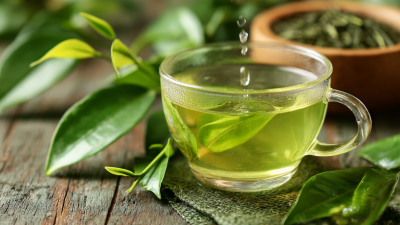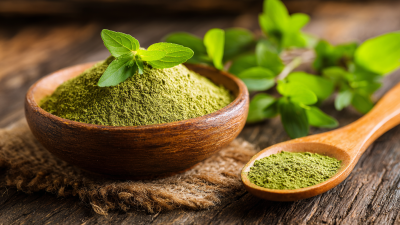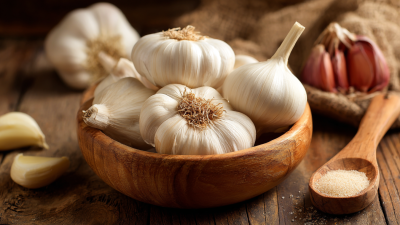Green Tea Extract Versus Other Natural Antioxidants A Comparative Analysis of Efficacy and Health Benefits
In recent years, the popularity of natural antioxidants has surged, with many individuals seeking alternatives to synthetic additives for promoting health and wellness. Among these, Green Tea Extract has garnered significant attention due to its potent antioxidant properties, primarily attributed to its high concentration of catechins, particularly epigallocatechin gallate (EGCG).
According to a report by the Global Antioxidants Market, the global demand for natural antioxidants, including Green Tea Extract, is expected to reach USD 4.2 billion by 2027, driven by the growing awareness of health benefits associated with antioxidants in combating oxidative stress and chronic diseases.
This comparative analysis will delve into the efficacy and health benefits of Green Tea Extract relative to other prominent natural antioxidants, providing insights into their roles in enhancing health and well-being.
Understanding Antioxidants: The Role of Natural Compounds in Health
Antioxidants are vital components of a healthy diet, playing a crucial role in neutralizing free radicals and reducing oxidative stress. Among the natural compounds that function as antioxidants, various sources such as fruits, vegetables, and herbs offer numerous health benefits. Understanding the mechanisms by which these natural compounds operate can provide insights into their impact on our overall wellbeing. For instance, polyphenols found in green tea are recognized for their potent antioxidant properties, which have been linked to a lower risk of chronic diseases, including cardiovascular ailments and certain cancers.
In contrast to other natural antioxidants like vitamin C and curcumin, green tea extract stands out due to its high concentration of catechins. These bioactive compounds not only provide robust antioxidant support but also enhance metabolic functions and aid in weight management. As research evolves, it becomes increasingly clear that the bioavailability and efficacy of these natural compounds can vary significantly. By engaging with a diverse range of antioxidants from a variety of sources, individuals can optimize their health benefits and harness the full potential of these natural allies in disease prevention and health promotion.
Green Tea Extract Versus Other Natural Antioxidants
| Natural Antioxidant |
Efficacy |
Health Benefits |
Bioavailability |
Safety Profile |
| Green Tea Extract |
High |
Weight loss, heart health |
Moderate |
Generally safe |
| Curcumin |
Moderate |
Anti-inflammatory, cancer prevention |
Low |
Generally safe |
| Resveratrol |
Moderate |
Cardiovascular health, longevity |
Low |
Generally safe |
| Vitamin C |
High |
Immune support, skin health |
High |
Generally safe |
| Alpha-Lipoic Acid |
Moderate |
Diabetes management, nerve function |
Moderate |
Generally safe |
The Unique Benefits of Green Tea Extract: A Deep Dive
When considering the unique benefits of green tea extract, one cannot overlook its powerful role as a natural antioxidant. Green tea catechins, the primary active compounds, offer remarkable metabolic health benefits that are increasingly supported by clinical studies. These catechins not only assist in weight management, but also aid gut health by reducing mucosal inflammation, thereby promoting a healthier digestive system. This nuanced interplay between green tea catechins and intestinal-level bioactivities distinguishes green tea extract from other antioxidants.
Moreover, the versatility of green tea extract extends beyond its metabolism-enhancing properties. Compared to other superfoods, such as matcha, extracts deliver concentrated doses of antioxidants that can enhance overall wellness. Recent findings highlight that while matcha offers its own array of benefits, green tea extract remains a formidable contender in the realm of natural health supplements. Both options cater to those seeking holistic approaches to wellness, yet the distinct mechanisms through which green tea extract works may provide added advantages particularly aimed at proactive weight management and metabolic support.
Green Tea Extract vs. Other Natural Antioxidants: A Comparative Analysis
This chart compares the efficacy scores of various natural antioxidants, highlighting the superior efficacy of Green Tea Extract compared to others. Each antioxidant is rated on a scale from 1 to 10 based on its health benefits and antioxidant capabilities.
Comparative Efficacy: Green Tea Extract Versus Other Natural Antioxidants
When comparing the efficacy of green tea extract to other natural antioxidants, it’s important to consider their unique biochemical properties and health benefits. Green tea extract is rich in catechins, particularly epigallocatechin gallate (EGCG), which have been extensively studied for their powerful antioxidant capabilities. Research suggests that these catechins can effectively neutralize free radicals, reduce oxidative stress, and even aid in weight management. In contrast, other natural antioxidants, such as resveratrol found in red wine and vitamin C from fruits, also show promising effects but may not match the specific metabolic advantages of green tea extract.

Furthermore, while various natural antioxidants can support overall health, the multifaceted benefits of green tea extract are noteworthy. Evidence indicates that it may enhance cardiovascular health by improving lipid profiles and reducing inflammation. Additionally, green tea extract has shown potential in cancer prevention through its ability to inhibit tumor growth. Other natural antioxidants contribute significantly to health, yet the synergistic effects of green tea's compounds may offer an edge in promoting longevity and wellness. The comparison underscores the importance of choosing the right antioxidant for specific health goals, with green tea extract often standing out for its comprehensive benefits.
Synergistic Effects: How Combining Antioxidants Enhances Health Benefits
Recent research highlights the remarkable synergistic effects of combining various antioxidants to enhance health benefits, particularly in relation to exercise and nutritional supplementation. For instance, a study on cancer patients during the COVID-19 pandemic suggests that the integration of dietary supplements with exercise may significantly boost immune responses, ultimately improving health outcomes. This approach aligns with findings in other studies, which indicate that polyphenol-rich foods, when paired with dietary fiber, can effectively modulate gut microbiota, leading to improved metabolic health and microbial profiles.
Moreover, new investigations into specific combinations, such as astaxanthin and curcumin, have shown promising results in enhancing ovarian function in polycystic ovary syndrome (PCOS) mouse models. These findings illustrate the potential of synergistic combinations not only to amplify the antioxidant effects but also to address various health issues more effectively. In addition, research into essential oils reveals their combined antioxidant and antimicrobial properties, underscoring the importance of synergistic actions in optimizing health. Such integrative approaches in nutrition and health management could pave the way for innovative strategies to combat chronic diseases and enhance overall wellness.
Practical Tips: Incorporating Green Tea Extract and Other Antioxidants into Your Diet
Incorporating green tea extract and other natural antioxidants into your diet can be an enjoyable and straightforward process. One of the easiest ways to start is by adding green tea to your daily routine. Consider swapping your morning coffee for a cup of green tea. This not only offers a gentle caffeine boost but also provides a wealth of antioxidants that can help enhance your overall health.
Additionally, green tea extracts can be added to smoothies or yogurt for a nutritious breakfast option.

Another great tip is to diversify your intake of other natural antioxidants. Berries, such as blueberries, raspberries, and strawberries, are packed with phytonutrients and can be easily included in various meals. You might toss them into salads, oatmeal, or snack on them plain.
Furthermore, incorporating spices like turmeric and cinnamon in your cooking not only enhances flavor but also adds potent antioxidant benefits.
By combining these nutrient-rich foods, you’ll create a delicious, health-promoting diet that includes a variety of antioxidants.

About Us
Products
Nutraceuticals
Botanical Extracts
Berberis Extract
Ginkgo Biloba Extract
Rutin
Quercetin
Grape Seed Extract
European Bilberry Extract
Broccoli Seed Extract
Fisetin
Ajuga Extract
Resveratrol
Stevia Leaf Extract
Green Tea Extract
Olive Leaf Extract
Epimedium Extract
Rhodiola Rosea Extract
Panax Ginseng Extract
Pomegranate Extract
Garlic Extract
Milk Thistle Extract
Black Pepper Extract
Fruit & Vegetable Juice Powder
Customized Service
News
Blog
Contact Us








